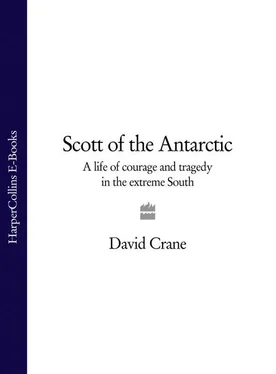If in many ways, however, the navy was no more than a victim of its own unparalleled success, in the transition from a war footing to peacetime duties it had undoubtedly lost its way. In every generation there were individuals who could see what needed to be done, but as the old fighting machine settled into its new role, the old ‘purser’ turned into the new ‘paymaster’ and the old working-class ‘tarpaulin’ captain disappeared from the bridge, the instinctual, lateral-thinking, individualist, anti-hierarchical ‘autocrat’ of Nelson’s navy gave way to the ‘authoritarian personality’ and the culture of deference, inflexibility, secretiveness, meticulousness, obsessive cleanliness and social rigidity that dominated the Victorian service. *
The period in Royal Naval history in which Scott joined the service has not been called the ‘Dark Ages’ for nothing, and few institutions have ever offered so many hostages to satire as the late-Victorian navy. At the height of its prestige in the 1880s it was the equal in size of any other five navies in the world combined, and yet within a generation its ships and its reputation were both gone, leaving behind only memories of whitewashed coal piles and exquisitely choreographed collisions, of choleric captains, holystoned decks and the endless ‘bull’ of a peacetime service devoted to order, cleanliness, appearance, uniformity and uniforms.
Almost every memoir of the nineteenth century enshrines some particular favourite – the officer who thought he was the ship’s boiler, and lay in his bed all day puffing out imaginary steam; the young Lord Charles Beresford who kept an elephant on board; the captain who would fly-fish from the poop deck for his first officer; the fitness fanatic Sir Robert Arbuthnot, who sentenced a sailor to death for blistered feet – but against stiff competition, perhaps Sir Algernon ‘Pompo’ Heneage gets the nod.
A man of wonderful and unabashed vanity, Heneage would break two eggs over his blond hair every morning, and take off his uniform for prayers because no Royal Navy captain should be seen kneeling to a higher deity. It was the same Algernon Heneage who instituted the practice of white kid gloves for the captain’s inspection, progressing through a terrified ship, his cox’n behind him carrying another dozen clean pairs on a silver tray, as Heneage groped behind pipes and down lavatory bowls for the traces of dirt that could damn an executive officer’s career for ever.
Perhaps the most alarming thing, however, about the dandified Heneage – he had 240 dress shirts in the Pacific, and sent them home to be laundered in London and returned in air-tight crates – was that he was by no means unique. There was a kind of magnificence about his self-esteem that gave him a semi-legendary status even during his lifetime, but as the letters and recollections of junior officers from future First Sea Lords down to the young Scott make plain, the petty tyranny and small-mindedness he embodied was the norm rather than the exception in a navy bent on turning its officers from fighting men into what the great naval reformer Jacky Fisher called ‘a sort of upper housemaid’.
It is not the whole story, of course, and even during the Pax Britannica of the late Victorian age, a number of Scott’s term in Britannia would see active service before they were out of their twenties. It is certainly true that the navy had fought no fleet action since the last bizarre fling of the Nelson navy at Navarino in 1827, but for most of the years since it had been on duty somewhere or other, its midshipmen and junior officers learning their trade and winning some forty-odd VCs in the long, unglamorous war against slavery or in campaigns that ranged from the Baltic to the Crimea and from the Sudan and the relief of Lucknow to China, Burma and the South Seas.
The oddity of it was, however, that in a service where captains would rather jettison shells than risk dirtying their ships by firing them, the most insidious temptation for a young midshipman of Scott’s generation lay in everything that had been best in the navy rather than what was worst. From the day in 1757 that Admiral Byng was shot on his own quarterdeck ‘ pour encourager les autres ’, *every naval cadet was brought up to know that valour was the better part of discretion, and for a man like Scott, Shackleton’s famous quip that a ‘live donkey’ was better than a ‘dead lion’ could have been no more an option than it would be for those other Britannia -reared officers who unswervingly followed Admiral Craddock to the bottom of the sea in the hopelessly unequal Battle of Coronel less than three years after Scott’s own death. *
In Scott’s case it would always be the virtues of naval life – the call to duty, the demands on courage – that exercised their tyranny over him, and casting its seductive, deadly light over these values was the Victorians’ obsession with medieval chivalry and a mythical Camelot. The cult of medievalism this stemmed from went back to the Romantics and the novels of Sir Walter Scott, but over the succeeding generations it had somehow entwined itself round other concepts of English gentility, lending a pseudo-historical legitimacy and glamour to those ideals of amateurism and cleanliving, games-playing Christianity that became such an integral part of an ethic that elevated the Grail-like quest with all its attendant hardships and inbuilt glorification of failure above any vulgar insistence on mere victory .
The history and traditions of naval polar expeditions during the nineteenth century, which will be examined later in their proper context, would eventually confront Scott with this culture in its most absolute form, but there was another and no less chimerical development that had an equally injurious effect on the training of the young nineteenth-century naval officer. One of the great mysteries of the Victorian service is the way in which it succeeded in misinterpreting the Nelson legacy as badly as it did; but nothing in its catastrophic misunderstanding of its own past was more perverse than its belief that the secret of Nelson’s genius lay in his total mastery of the battleground, rather than an ability to promote individuals of the same independent stamp as himself.
The result of this reading of history – abetted by crucial developments in flag signalling that gave any commander a potential 330,000 signals †– was a culture that made independent thought a crime and raised abstract theory and complex orders above the traditional empiricism that had been the great strength of the British navy. To all intents and purposes Nelson had left his captains to get on with their jobs, but by Scott’s day the only prerequisite of a good subordinate was not ‘Duty’ in the overmastering sense that Nelson had used the word, but blind, unquestioning obedience. ‘A good deal has been said of late as to the freedom being given to inferiors to question and disobey the orders of a superior officer,’ the Duke of Cambridge told cadets in the aftermath of the Camperdown tragedy of 1893, when in the depths of peace and the clear light of a Mediterranean summer’s day Albert Markham had rammed and sunk the Victoria with the loss of Sir George Tryon, Britain’s greatest admiral since Nelson, and 433 other lives rather than disobey a patently ludicrous order. ‘Discipline must be law, and must prevail. It is better to go wrong according to orders than to go wrong in opposition to orders.’
Conformity, obedience, centralisation, abstract reasoning, unthinking bravery, chivalric idealism, unswerving duty in the narrowest sense of the word – these, then, were the battle cries of the navy Scott joined, and even if he could have foreseen the tragedy they would bring him to almost thirty years later it is unlikely that he would have had the strength to resist them. There were obviously Young Turks in every generation who had the self-confidence or the independence of means to buck the system, but for a fifteenyear-old of Scott’s background and circumstances, without the connections or social assurance of a Tryon or a Beatty, conformity was not just a temptation but a sine qua non of survival.
Читать дальше












![John Bruce - The Lettsomian Lectures on Diseases and Disorders of the Heart and Arteries in Middle and Advanced Life [1900-1901]](/books/749387/john-bruce-the-lettsomian-lectures-on-diseases-and-disorders-of-the-heart-and-arteries-in-middle-and-advanced-life-1900-1901-thumb.webp)